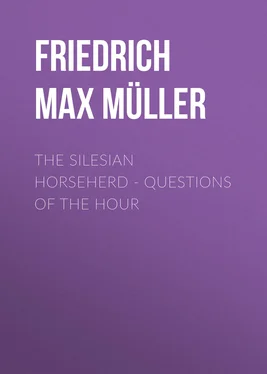Friedrich Max Müller - The Silesian Horseherd. Questions of the Hour
Здесь есть возможность читать онлайн «Friedrich Max Müller - The Silesian Horseherd. Questions of the Hour» — ознакомительный отрывок электронной книги совершенно бесплатно, а после прочтения отрывка купить полную версию. В некоторых случаях можно слушать аудио, скачать через торрент в формате fb2 и присутствует краткое содержание. Жанр: foreign_prose, foreign_religion, Философия, foreign_psychology, foreign_antique, на английском языке. Описание произведения, (предисловие) а так же отзывы посетителей доступны на портале библиотеки ЛибКат.
- Название:The Silesian Horseherd. Questions of the Hour
- Автор:
- Жанр:
- Год:неизвестен
- ISBN:нет данных
- Рейтинг книги:4 / 5. Голосов: 1
-
Избранное:Добавить в избранное
- Отзывы:
-
Ваша оценка:
- 80
- 1
- 2
- 3
- 4
- 5
The Silesian Horseherd. Questions of the Hour: краткое содержание, описание и аннотация
Предлагаем к чтению аннотацию, описание, краткое содержание или предисловие (зависит от того, что написал сам автор книги «The Silesian Horseherd. Questions of the Hour»). Если вы не нашли необходимую информацию о книге — напишите в комментариях, мы постараемся отыскать её.
The Silesian Horseherd. Questions of the Hour — читать онлайн ознакомительный отрывок
Ниже представлен текст книги, разбитый по страницам. Система сохранения места последней прочитанной страницы, позволяет с удобством читать онлайн бесплатно книгу «The Silesian Horseherd. Questions of the Hour», без необходимости каждый раз заново искать на чём Вы остановились. Поставьте закладку, и сможете в любой момент перейти на страницу, на которой закончили чтение.
Интервал:
Закладка:
F. Max Müller
The Silesian Horseherd – Questions of the Hour
Preface
The story of this volume is soon told. In July, 1895, Professor Max Müller contributed to the Deutsche Rundschau an essay on the lost treatise against Christianity by the philosopher Celsus, known to us through the reply of Origen of Alexandria. This essay, entitled “The ‘True History’ 1 1 The Greek term “logos” was rendered Geschichte in the German title.
of Celsus,” contained an exposition of the doctrine of the Logos and its place in Christian teaching, with reference also to its applications in our modern thought. Among the comments upon it which in due time found their way to Oxford, was a vigorous, if familiar, letter (dated February, 1896) from a German emigrant to the United States, residing in Pennsylvania, who signed himself by the unusual name of the Pferdebürla , or “Horseherd.” 2 2 The word Pferdebürla is apparently a Silesian equivalent for Pferdebursche , and is represented in this volume by the term “horseherd,” after the analogy of cowherd, swineherd, or shepherd. The termination bürla is probably a local corruption of the diminutive bürschel or bürschlein .
His criticisms served as a fair sample of others; and his letter was published with a reply from Professor Max Müller in the Rundschau of November, 1896. More letters poured in upon the unwearied scholar who had thus set aside precious time out of his last years to answer his unknown correspondent. One of these, from “Ignotus Agnosticus,” supplied a text for further comment, and the whole grew into a little popular apologia , which was published at Berlin in 1899, and entitled Das Pferdebürla , or “Questions of the Day answered by Friedrich Max Müller.”
The veteran teacher thus enforced once more his ideas of the relation of language and thought, in which he had long since recognised the clue to man's knowledge of the relation of his spirit to God. This inner union he found realised in Christ, according to the testimony of the Fourth Gospel; 3 3 “What difference does it make,” he would ask, “whether it was written by the son of Zebedee, or some other John, if only it reveals to us the Son of God?” (letter from the Vicar of St. Giles's, Oxford, Life and Letters , II, Chap. xxxvi.).
and the lucid treatment of this great conception, freed from the technicalities of theology, will possibly prove to some readers the most helpful portion of this book. Ranging over many topics, once the themes of vehement controversy, the discussion has often an intimate, familiar, personal air. The disputants on opposite sides had drawn nearer; they could better understand each other's points of view. 4 4 See the letters between Max Müller and Dr. G. J. Romanes, Life and Letters , II, Chap. xxxi.
These pages, therefore, reveal the inmost beliefs of one who had devoted more than fifty years to the study of the history of religious thought on the widest scale, and had himself passed through severe struggles and deep griefs with unshaken calm. No reader of Max Müller's writings, or of the Life and Letters , can fail to recognise in these trusts the secret unity of all his labours. The record of human experience contained in the great sacred literatures of the world, and verified afresh in manifold forms from age to age, provided a basis for faith which no philosophy or science could disturb.
This is the key to the reasonings and appeals of this little book. It was translated as a labour of love by Mr. Fechter, Mayor of North Yakima, in the United States. The translation has been revised on this side of the Atlantic, and is now offered to the public in the belief that this final testimony of a “voice that is still” to the reality of “things unseen” will be welcome to many inquiring and perhaps troubled minds.
J. ESTLIN CARPENTER.Oxford, April 2, 1903.
Chapter I.
The True History Of Celsus
The following essays, which were intended primarily for the Horseherd, but which were published in the Deutsche Rundschau , demand a short explanatory introduction. This, I believe, can best be given by me, by means of a reprint of another essay which appeared in the same periodical, and was the direct cause for the letter, which the writer, under the name of “Horseherd,” addressed to me. I receive many such anonymous communications, but regret that it is only rarely possible for me to answer them or to give them attention, much as I should like to do so. In this particular case, the somewhat abrupt, but pure, human tone of the letter appealed to me more than usual, and at my leisure I attempted an answer. My article, which called forth the letter of the Horseherd, was entitled “The ‘True History’ of Celsus,” 5 5 Ueber die Wahre Geschichte des Celsus.
in the July number of the Deutsche Rundschau , 1895, and, with a few corrections, is as follows:—
In an article which appeared in the March number of the Deutsche Rundschau , 1895, entitled “The Parliament of Religions in Chicago,” I expressed my surprise that this event which I had characterised as in my opinion the most important of the year 1893, had been so little known and discussed in Germany—so little, that the editors of the Wiener Fremdenblatt thought it needful to explain the nature of the Chicago Congress. Likewise, when in answer to the question as to what I should consider the most desirable discovery of the coming year in my department, I answered the discovery of the Sermo Verus of Celsus; this, too, appeared to be a work so little known, that the editors considered it necessary to add that Celsus was a renowned philosopher of the second century, who first subjected the ever spreading system of Christianity to a thorough criticism in a work entitled Sermo Verus . The wish, yes, even the hope, that this lost book, of which we gain a fair idea from the reply of Origen, should again make its appearance, was prompted by the recent discoveries of ancient Greek papyrus manuscripts in Egypt. Where so many unexpected discoveries have been made, we may hope for yet more. For who would have believed that ancient Greek texts would be found in a mummy-case, the Greek papyrus leaves being carelessly rolled together to serve as cushions for the head and limbs of a skeleton? It was plain that these papyrus leaves had been sold as waste paper, and that they were probably obtained from the houses of Greek officials and military officers, who had established themselves in Egypt during the Macedonian occupation, and whose furniture and belongings had been publicly sold and scattered on occasion of their rapid withdrawal. There were found not only fragments of classical texts, as of Homer, Plato, and the previously unknown treatise on “The Government of the Athenians,” not, perhaps, composed, but utilised, by Aristotle, but also many fragments of Christian literature, which made it probable that the libraries of Christian families also had been thrown on the market, and that papyrus leaves, when they appeared useless for any other purpose, were used as waste paper, or as a kind of papier-maché.
But why should the “True History” of Celsus, the λόγος ἀληθής, or Sermo Verus , excite our curiosity? The reason is quite plain. We know practically nothing of the history of the teaching of Christ in the first, second, and even third centuries, except what has been transmitted to us by Christian writers. It is an old rule, however, that it is well to learn from the enemy also,—“Fas est et ab hoste doccri.” Celsus was a resolute foe of the new Christian teaching, and we should, at all events, learn from his treatise how the Christian religion appeared in the eyes of a cultivated man of the second century, who, it seems, concurred in many important points with the philosophical conception cherished in the Christian church, or at least was familiar with it, namely, the Logos idea; but who could not comprehend how men, who had once understood and assimilated a view of the world founded on the Logos, could combine with it the belief in Christ as the incarnate Logos. To Celsus the Christian religion is something objective; in all other works of the first three centuries it is, and remains, almost entirely subjective.
Читать дальшеИнтервал:
Закладка:
Похожие книги на «The Silesian Horseherd. Questions of the Hour»
Представляем Вашему вниманию похожие книги на «The Silesian Horseherd. Questions of the Hour» списком для выбора. Мы отобрали схожую по названию и смыслу литературу в надежде предоставить читателям больше вариантов отыскать новые, интересные, ещё непрочитанные произведения.
Обсуждение, отзывы о книге «The Silesian Horseherd. Questions of the Hour» и просто собственные мнения читателей. Оставьте ваши комментарии, напишите, что Вы думаете о произведении, его смысле или главных героях. Укажите что конкретно понравилось, а что нет, и почему Вы так считаете.












